Table of Contents
M276 Specifications and Technical Details
M276 Engine is offered in multiple variants, typically ranging from 3.0 to 3.5 liters in displacement. This V6 powerplant is known for its advanced engineering, featuring technologies such as direct fuel injection, turbocharging, and variable valve timing, all designed to enhance performance and fuel efficiency.
Power output varies between 248 and 362 horsepower, depending on the specific version and the model it’s installed in, making it a versatile option across the Mercedes-Benz lineup.
Mercedes M276 construction includes a lightweight aluminum block and cylinder heads, contributing to better heat dissipation and reduced overall weight. Most versions are equipped with a twin-scroll turbocharger, which delivers smooth and responsive power delivery with minimal turbo lag.
Compared to other Mercedes engines, the M276 stands out for its balance between performance and refinement, making it a favorite among enthusiasts and engineers alike for both daily driving and spirited performance. This article provides an in-depth exploration of the M276 engine, including its history, reliability, performance, and common issues.
M272 and M276 torque and power curve

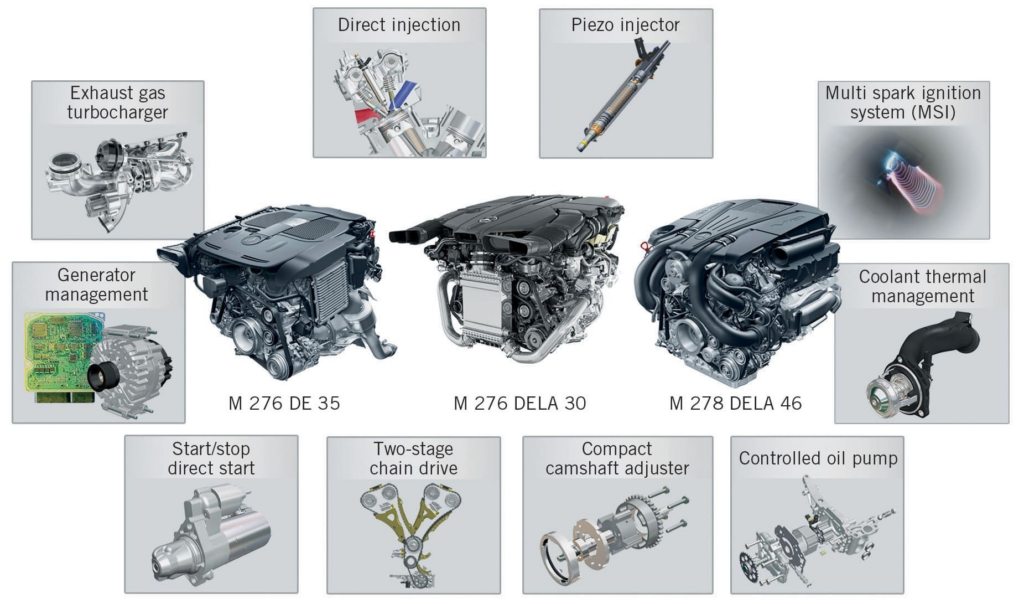
The Mercedes M276 is a gasoline direct-injection (DI) engine available in both naturally aspirated and turbocharged versions. Designed to replace the M272 Engine, it aims to improve CO₂ emissions, reduce engine noise, and modestly increase power and torque.
Part of the M270/M274/M276/M278 family, the M276 shares many major systems with its counterparts, including new intake air and engine thermal management systems, and features the ECO Start/Stop function as standard. The crankcase V angle was changed from 90° to 60°, eliminating the need for a balance shaft.
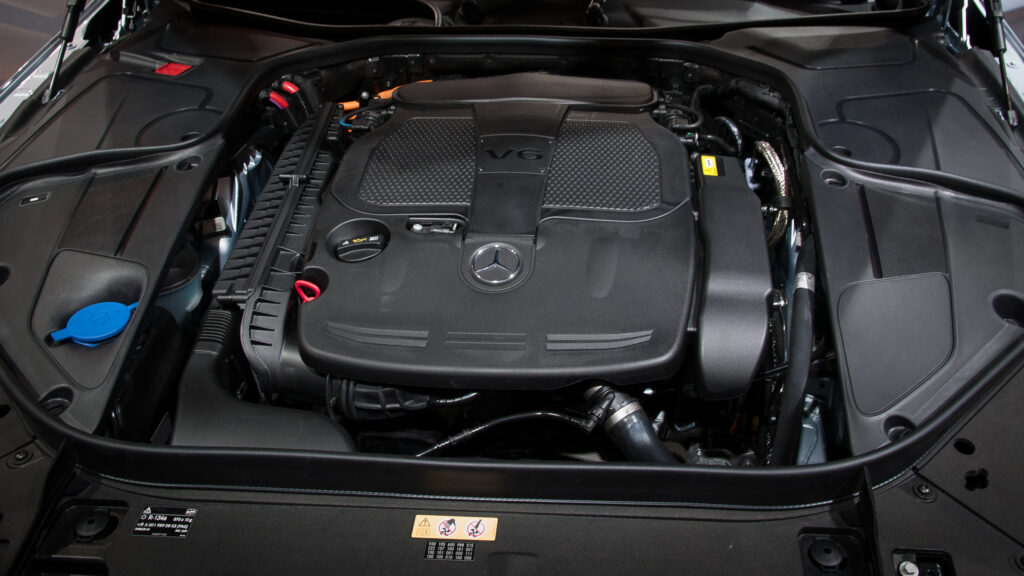
| Manufacturer | Daimler AG |
| Production years | 2010-present |
| Cylinder block material | Aluminum |
| Cylinder head material | Aluminum |
| Fuel type | Gasoline |
| Fuel system | Direct Injection |
| Configuration | V |
| Number of cylinders | 6 |
| Valves per cylinder | 4 |
| Valvetrain layout | DOHC |
| Bore, mm | 88.0 mm (3.46 in) – 3.0L 92.9 mm (3.66 in) – 3.5L |
| Stroke, mm | 82.1 mm (3.23 in) – 3.0L 86.0 mm (3.39 in) – 3.5L |
| Displacement, cc | 2,996 cc (182.8 cu in) 3,498 cc (213.4 cu in) |
| Type of internal combustion engine | Four-stroke, naturally aspirated/turbocharged |
| Compression Ratio | 10.7:1 – M276 DE35LA and M276 DE30LA 12.0:1 – M276 DE 35 red. 12.2:1 – M276 DE 35 |
| Power, hp | 272-367 hp (200-270 kW)/5,000-6,000 – M276 3.0 version 252-333 hp (185-245 kW)/6,000-6,500 – M276 3.5 version |
| Torque, lb ft | 295-384 lb-ft (400-520 Nm)/1,300-4,000 – M276 3.0 version 251-354 lb-ft (340-480 Nm)/1,200-5,200 – M276 3.5 version |
| Engine oil weight | MB 229.5/229.51, SAE 0W-30, 0W-40, 5W-30, 5W-40 |
| Engine oil capacity, liter | 6.5 l (6.9 qt) |
| Oil change interval, mile | 9,000 (15,000 km) / 12 months |
| Applications | CLS 300, CLS 350, CLS 400, ML 350, ML 400, GL 400, C 350, C 400, C 450 AMG, E 300, E350, E 400, S 350, S 500 PLUG-IN HYBRID, SL 400, R 400, GLE 400 Coupe, GLE 450 AMG (Coupe), S 400 4MATIC Coupe, ML 300 4MATIC, GLK 350, SLK 350. |
M276 Engine Reliability
The Mercedes M276 engine is a prominent member of Mercedes-Benz’s engine lineup, known for its advanced technology and performance capabilities. This V6 engine has been used in various models across the Mercedes range, offering a blend of power, efficiency, and reliability.
Chain Drive and Camshaft Adjustment
As mentioned previously, this engine uses a total of four chains in the engine timing and oil pump drive system. The goal here was to improve engine noise and endurance while reducing friction.
A short chain goes from the crankshaft to the intermediate gear at a ratio of 1:1.33. The two camshaft chains are then driven by this intermediate gear at a ratio of 1:1.5. All three chains are tensioned by hydraulic chain tensioners.
As with earlier engines, another short chain from the crankshaft is used to drive the oil pump. Since the camshaft adjustment system is very similar to other engines, we won’t discuss it further. WIS has a GF document describing the function in detail


Engine Air Supply
To help engine efficiency, an air intake path needs to have a low resistance to air flow, yet maintain favorable flow conditions under all possible circumstances. Intake air is passed through a relatively large air filter to minimize flow resistance and is delivered to the intake manifold.
There, depending on operating condition, the length of the intake ducts is varied so the engine torque curve can be optimized.
Two resonance flaps, a central resonance chamber and a selector drum accomplish the varying duct lengths. Of course, the entire system is controlled by the ME control unit. As a side note, in the M276.9 turbocharged engine, the intake manifold system is different.
Rather than having a variable intake duct system, it is more conventional with a fixed system of intake ducts and, of course, a pair of turbochargers.

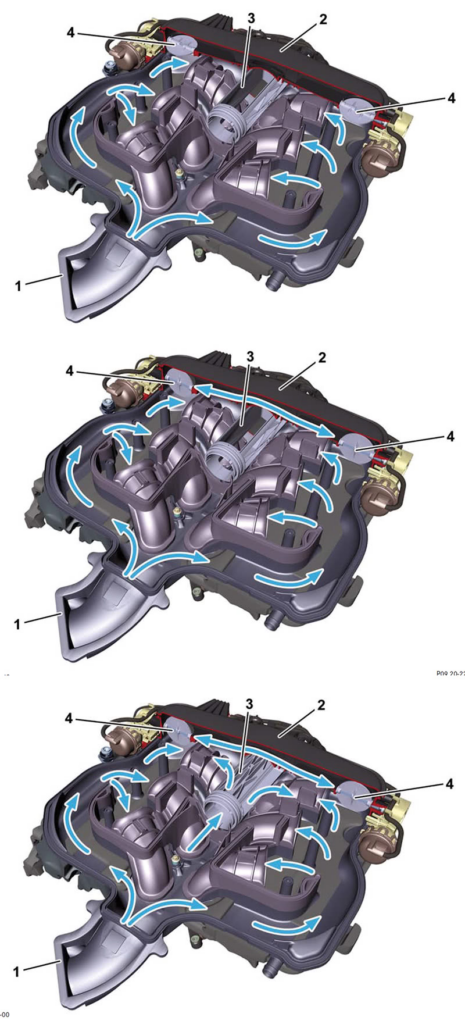
Is the Mercedes M276 a good engine?
The Mercedes-Benz M276 engine is generally considered a good engine, but like any complex machine, it has its strengths and weaknesses. Here’s an overview:
Strengths:
1. Performance
The Mercedes M276 is a V6 engine that comes in various displacements (3.0L and 3.5L). It’s known for providing solid power and torque, especially in turbocharged variants. It offers good acceleration and performance, making it suitable for both luxury sedans and SUVs.
2. Fuel Efficiency
With direct fuel injection and other modern technologies, the M276 offers decent fuel efficiency, especially compared to earlier V6 engines from Mercedes. The 3.0L turbo variant, in particular, strikes a good balance between power and fuel economy.
3. Smoothness
The M276 is known for its refinement and smooth power delivery. It’s designed to offer a quiet, vibration-free experience, contributing to the overall luxury feel of the vehicle.
4. Longevity
When well-maintained, the M276 can be quite reliable and long-lasting. Regular oil changes, along with proper care of components like the timing chain, can lead to years of dependable performance.
M276 engine problems
- Timing Chain Issues:
One of the more notable issues reported with the M276 is related to the timing chain, particularly in early versions of the engine. Over time, the chain can stretch, leading to potential engine damage if not addressed. Regular inspection and early replacement can prevent major problems. - Oil Leaks:
Some owners report oil leaks, particularly around the valve covers and oil cooler seals. These leaks can lead to low oil levels if left unchecked and need to be addressed promptly. - Carbon Build-Up:
Like many direct-injection engines, the M276 can suffer from carbon build-up on intake valves, which can lead to performance issues over time. Regular maintenance such as walnut blasting or using quality fuel can help mitigate this. - Water Pump Failures:
Water pumps have been known to fail in certain instances, leading to potential overheating. Keeping an eye on the cooling system is essential for preventing this issue.
Learn in the following links about the Common M276 engine problems;
Engine Crank But no Start: Keep it Simple
Noise Timing Chain: Find the Process to the Solution 100%
Car Starts Then Dies Immediately: Here’s How We Fix it
Oil Leak From Camshaft Magnet: Stop the Leak with This Quick Repair
The Mercedes M276 is a well-engineered engine that offers strong performance, efficiency, and refinement. While it has a few known issues, most can be managed with regular maintenance. If you’re considering a vehicle equipped with the M276, be sure to check for signs of timing chain wear and oil leaks, and factor in the cost of maintaining direct injection components.
What cars use the M276 engine?
The Mercedes-Benz M276 engine has been used in various models across the brand’s lineup, from sedans and coupes to SUVs. Here’s a list of notable cars that use the M276 engine:
Sedans & Coupes:
- Models: C 400, C 450 AMG, C 43 AMG (M276 DE 30 LA, 3.0L twin-turbo V6)
Mercedes-Benz E-Class (W212, W213)
- Models: E 400, E 450 (M276 DE 30 LA, 3.0L twin-turbo V6)
Mercedes-Benz CLS (W218, W257)
- Models: CLS 400, CLS 450 (M276 DE 30 LA, 3.0L twin-turbo V6)
Mercedes-Benz S-Class (W221, W222)
- Models: S 400, S 450 (M276 DE 30 LA, 3.0L twin-turbo V6)
SUVs:
Mercedes-Benz GLE-Class (W166, W167)
- Models: GLE 400, GLE 450 (M276 DE 30 LA, 3.0L twin-turbo V6)
Mercedes-Benz GLC-Class (X253)
- Models: GLC 43 AMG (M276 DE 30 LA, 3.0L twin-turbo V6)
- Models: G 350, G 500 (M276 DE 35, 3.5L V6, naturally aspirated or twin-turbo in some variants)
- Models: GL 400 (M276 DE 30 LA, 3.0L twin-turbo V6)
Other Models:
Mercedes-Benz SL-Class (R231)
- Models: SL 400, SL 450 (M276 DE 30 LA, 3.0L twin-turbo V6)
Mercedes-Benz SLC-Class (R172)
- Models: SLC 43 AMG (M276 DE 30 LA, 3.0L twin-turbo V6)
The M276 engine, especially the turbocharged variants, has been a popular choice in performance-oriented Mercedes models as well as luxury sedans and SUVs. It offers a good balance between power and fuel efficiency, making it versatile for different segments.
Maintenance and Care Tips
Proper maintenance is crucial for the optimal performance and longevity of the M276 engine. Adhering to a regular maintenance schedule, which includes oil changes, filter replacements, and inspections, is vital. Using the recommended oil types and intervals helps maintain the engine’s health.
Ensuring the cooling system is in top condition can prevent overheating and related issues. Simple maintenance practices, such as checking coolant levels and keeping the engine clean, can significantly extend the engine’s lifespan.
What is the recommended oil type for the M276 engine?
The recommended oil type for the Mercedes M276 engine is fully synthetic oil that meet the MB 229.51 specification. The commonly recommended viscosity grade is:
- 5W-40
This oil specification ensure optimal engine performance, protection, and longevity. Always consult your vehicle’s owner’s manual for the specific oil recommendations and intervals for your particular model and driving conditions. Regular oil changes and using the specified oil types are crucial to maintaining the health and efficiency of the M276 engine.
How to change oil in M276 Engine?
To change oil for M276 Engine, consult the following link ; Service A in Mercedes E Class : E350
How often should I change the oil in my M276 engine?
For the Mercedes M276 engine, it is recommended to change the oil every 10,000 miles or once a year, whichever comes first. However, if you drive under severe conditions, such as frequent short trips, extreme temperatures, or heavy towing, you may need to change the oil more frequently.
Always refer to your vehicle’s owner’s manual for the specific maintenance schedule and follow any additional guidelines provided by Mercedes-Benz for optimal engine performance and longevity.
Case Studies and Owner Experiences
Real-world experiences from M276 owners provide valuable insights into the engine’s performance and reliability. Many owners praise the engine for its powerful and efficient performance, highlighting its smooth acceleration and responsive handling.
However, some have encountered issues such as timing chain problems and oil leaks, emphasizing the importance of regular maintenance. These testimonials and reviews offer a comprehensive view of the M276’s strengths and areas for improvement.
M272 vs M276
When compared to its predecessor, the M276 engine offers several advancements in technology and performance. The M276’s turbocharging and direct injection technologies provide superior power and efficiency.
Additionally, the M276 competes favorably against engines from other manufacturers, offering a balanced mix of performance and fuel economy. The M276 has set the stage for future Mercedes engines, continuing the brand’s legacy of innovation and excellence.
Conclusion
In summary, the Mercedes M276 engine is a remarkable example of advanced engineering, offering a blend of performance, efficiency, and reliability. While it does have its common issues, regular maintenance and care can mitigate these problems.
Whether you are an enthusiast looking to upgrade your vehicle or a prospective buyer seeking a reliable engine, the M276 offers a compelling package. Share your experiences and insights with this engine to help others make informed decisions.

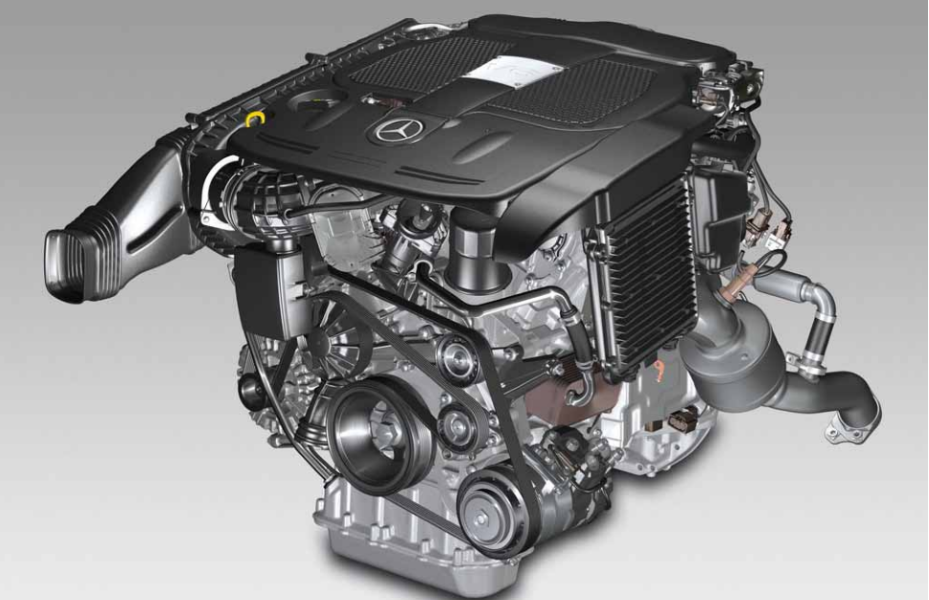

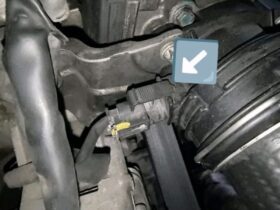
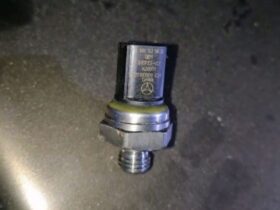
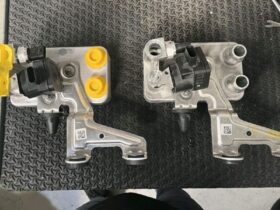
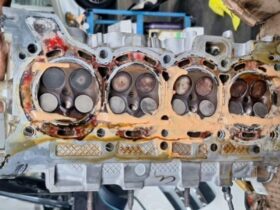
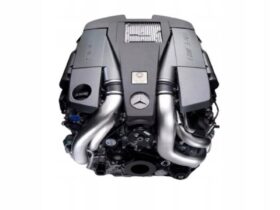
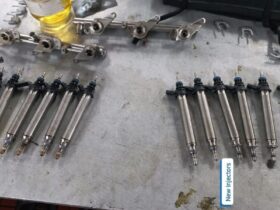
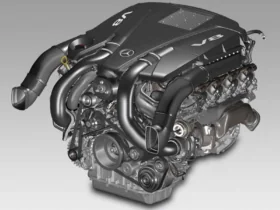
Leave a Reply